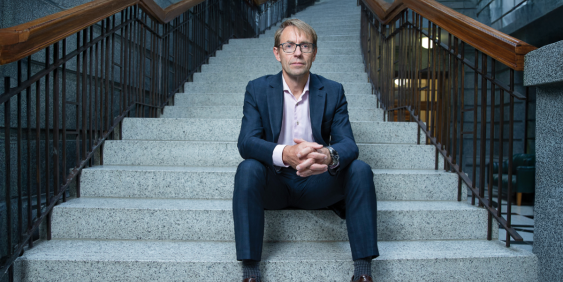
‘You listened us to agreement’ – leading with humility

Sir Ashley Bloomfield on the power of listening, governance and learning from every seat at the table.
It’s the kind of compliment that doesn’t come with applause – just quiet respect. And it’s a phrase that could easily apply to Sir Ashley Bloomfield CMInstD in those days fronting Aotearoa New Zealand’s Covid-19 response.
“You listened us to agreement” was a warm remark to US Senator George Mitchell by one of the former combatants in the 1998 Northern Ireland peace negotiations – a delegate who had initially refused even to sit in the same room.
Sir Ashley heard the story on a leadership podcast as he reflected on chairing negotiations at the World Health Organization to update the International Health Regulations – a complex, high-stakes process involving 194 countries, and successfully concluded in June 2024. The line stuck with him – “it was so powerful and I had been given the opportunity to put it into practice”.
“That’s the kind of leadership I believe in,” he says. “Not dominating the room but building trust. When things are complex, listening matters more than ever. I have to be honest – I don’t always live up to my own expectations, but leadership is a lifelong journey.”
Whether leading in a crisis, chairing a multilateral process, sitting on a board or stepping into a chief executive role, Sir Ashley returns again and again to the same principle: effective leadership and good governance begin with listening – deeply, respectfully, deliberately.
Since completing the IoD’s Company Directors’ Course in late 2022, Sir Ashley has moved between roles at board and executive level. His time as a director on the board of Environmental Science and Research (ESR) – now Public Health and Forensic Science – provided valuable insight, but it was stepping into the interim chief executive role that brought the board-executive dynamic into sharp focus. He also sits on the board of the Malaghan Institute of Medical Research, where he contributes to strategic direction while continuing to learn from seasoned directors.
But titles are less important than how you show up, he says. “Governance and leadership aren’t defined by where you sit. They’re defined by how you show up – and how you listen.”
Richness of good governance
When he joined the board at ESR, Sir Ashley was looking forward to contributing his public sector, public health and leadership experience. What surprised him most was how much he gained in return.
“I’d read the board papers and come prepared with my thoughts. But the real value came when I listened to the other directors. I’d often think, ‘I never would have thought of that.’ That’s the richness of good governance – drawing on diverse perspectives and being willing to learn.”
That experience proved essential when he stepped into the interim CEO role. “The first thing I told the team was: I’m no longer a director – I’m a staff member of the organisation. I had to be clear that I wasn’t bringing the board’s voice into the business. I was there to lead the executive and serve the board.”
This board-executive interface is something Sir Ashley understands deeply, particularly from his public service background.
“At the Ministry of Health, I didn’t report to a board – I still carried out many governance functions. Now that I’ve sat on both sides of the table, I see how important that distinction is. Boards need to stay out of operations, but they also need confidence and that comes from high-trust relationships and the right information.”
His time on the CDC helped crystallise this thinking. “It consolidated what I knew – and filled in what I didn’t. A week rarely goes by when I don’t refer to the Four Pillars: strategy, culture, monitoring and reporting. They’re so useful for keeping governance grounded and focused.”
Even with his background, Sir Ashley still calls himself “a toddler in governance” – not out of false modesty, but because he sees governance as a craft that requires lifelong learning. “I’m always learning. That’s why I joined the Malaghan board. Sir Paul Collins had given me some advice about the next steps in my governance career and a few days later I got an email inviting me to join the board, alongside Dame Patsy Reddy (DFInstD) and David Downs (CMInstD). I thought: ‘I can really learn something from these people’.”
His focus at Malaghan is on strategic contribution, public sector insight and supporting the organisation’s kaupapa. “It’s pro bono but deeply rewarding. And I hope my networks and experience bring something of value to the table.”
Values-led governance in a complex world
Sir Ashley says governance is never just about compliance or oversight. It’s about culture, ethics and leadership. “What matters isn’t what issue you’re facing – AI, geopolitics, climate, public health. What matters is how you lead through it. And for me, that always comes back to values-based leadership. Listening. Authenticity. Humility.”
He sees a growing global tension between populist, hubristic leadership and what he calls “real leadership” – quiet, thoughtful and connected. “The ‘big man’ leader can be appealing. They offer simple answers, but they’re not agile. They don’t listen. And they’re not the leaders we need in complex times.”
His reflections on AI echo that view. “AI isn’t about the technology – it’s about people. It has the potential to help us be better humans. But only if we use it deliberately, with care.”
He sees governance as essential to shaping how Aotearoa responds. “We can’t just leave AI to chance. If it’s as big as we say it is, shouldn’t we treat it like a major event? Set up cross-sector, cross-government responses to both manage the risks and seize the opportunities?”
Climate change and ESG, too, require that long view. “If we want sustained economic growth, we must rise above short-term thinking. That’s our biggest opportunity – and our biggest challenge. And if our political systems can’t always lead on these issues, then maybe business, civil society and communities need to step up.”
He points to his local council in Lower Hutt as a sign of what’s possible. “We’ve got a Pacific mayor, Māori and Pasifika councillors, Chinese, Indian and Pākehā leaders. There were kapa haka and Pacific dancers from the Polytech at the swearing-in, and a spontaneous haka led by former All Black Piri Weepu.
“It was a city comfortable in its diversity – and comfortable walking into the future. Seeing what that future holds – and the possibilities that diversity unlocks – is the kind of mindset our boards, in both the private and public sector, need to embrace.
“Let’s be honest about what our culture actually is – and what are the things we really value? We value fairness, manaakitanga, whanaungatanga.”
‘ESG is not a woke thing’
He pushes back on attempts to dismiss ESG and climate as political distractions.
“ESG is not a ‘woke’ thing. There’s really strong evidence that boards with diversity around the table, that listen to different perspectives and think long term – they perform better. It’s not just ethics. There’s science behind it. This shouldn’t be subject to political whims.”
As his fixed-term CEO role ends in 2026, Sir Ashley is already thinking ahead. “By then, I’ll have spent nearly 10 years as a chief executive. I’ll be ready to lean fully into governance. That’s where I think I can add the most value next.
“My heart remains in the public sector and health. That’s where my contribution could be most useful. But I’d also love to complement that by contributing in the private sector. There’s real richness in bringing those perspectives together – learning from both and applying insights across settings.”
While he’s not one to overstate his own journey, he’s clear on what makes good governance work – no matter the issue.
“Boards don’t always need to talk the most,” he says. “But they do need to listen – to their people, to their stakeholders, to each other.”
It’s how leadership earns trust. It’s how governance builds value. And sometimes, it’s how you get to agreement.


